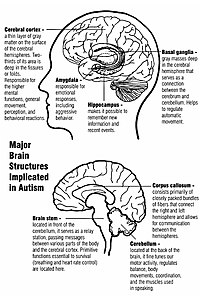
Photo from wikipedia
Necrotizing enterocolitis (NEC) is a digestive disease that frequently occurs in premature infants with low gestational age and low birth weight, and seriously threatens the life of NEC patients. NEC… Click to show full abstract
Necrotizing enterocolitis (NEC) is a digestive disease that frequently occurs in premature infants with low gestational age and low birth weight, and seriously threatens the life of NEC patients. NEC pathogenesis is recognized to be affected by multiple factors, such as preterm birth, formula feeding and low birth weight. As a popular object for the past decades, intestinal flora is commonly used in NEC‐related studies, and intestinal disorder is considered as a critical risk factor for the occurrence and development of NEC. The colonization of abnormal microbiota into gastrointestinal micro‐ecosystem can easily lead to the damage of intestinal mucosal barrier, destruction of immune function, inflammatory reaction and further the occurrence of NEC. Although it is a low‐cost and safe way to prevent and treat the NEC by early intervention of oral probiotics to regulate the intestinal homoeostasis, more studies in the future are still encouraged to narrow the gap between theoretical guidance and practical application.
Journal Title: Letters in Applied Microbiology
Year Published: 2022
Link to full text (if available)
Share on Social Media: Sign Up to like & get
recommendations!